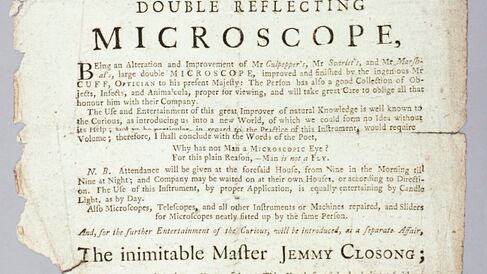Public Microscope Shows in the 18th Century

This 18th-century advertisement for a microscope show gives an unusual insight into the history of science. During the 18th century, opinions on the worth of the microscope differed greatly: some maintained that it could demonstrate more of God's creation, others that it was no more than a frivolous diversion.
A popular instrument?
"Why had not Man a MICROSCOPIC Eye? For this plain Reason, Man is not a Fly."
These two lines from Alexander Pope'sEssay on Man are quoted on a loose sheet (Image 1), printed circa 1760, advertising the following:
"To the LOVERS of Natural Curiosity, or Rational Amusement. To be SEEN at Mr. Johnston's Wig Ware-room. A VERY GOOD DOUBLE REFLECTING MICROSCOPE.
Demonstrating the microscope, with his "good Collection of Objects, Insects, and Animalcula", was John Cuff (1708-1772). Cuff's double reflecting microscope, made to the design and specifications of Henry Baker (1698-1774), became extremely popular and effectively replaced the more cumbersome 'Culpeper' design.
Four-function calculators that could add, subtract, multiply, and divide were, without doubt, great feats of engineering, but they remained limited devices best suited to simple arithmetic. In 1972 a huge advance beyond the four-function was released: a pocket scientific calculator that could compute transcendental functions like logarithms and square roots and that could be programmed to solve complex equations. Hewlett-Packard (HP) and Texas Instruments (TI) led the way in making electronic calculators essential tools for professionals and students, and placed calculators at the vanguard of the era of home programming.
Differing attitudes
The general response to the microscope in the mid-18th century was extremely ambivalent. Enthusiasm for recreating the experiments of Leeuwenhoek, Malpighi and Hooke was still high. Interest was also enhanced by Baker's publication of research into the unusual habits of polypes, tiny water-borne creatures. Polypes seemed to regenerate when cut in half, and this could be observed with an aquatic microscope. On the other hand, scepticism - sometimes even denunciation - was found in those who thought that the microscope could teach nothing new, and those who thought that man might be overreaching himself with research into the minute. Pope's scientific/moral poem reflected a general interest in the microscope, whilst urging restraint in its use: "The bliss of man (could pride that blessing find) / Is not to act or think beyond mankind". This recalls Christopher Marlowe'sDr. Faustus, who desired to know too much and fell in league with the devil.
However, the prevalent view was that use of the microscope actually led to a greater understanding of God's creation. Along with giving public microscope shows, instrument makers, such as Benjamin Martin (1705-1782), travelled and gave lectures. Solar microscopes, made by both Martin and Cuff, which allowed more than one person to view a projected and enlarged image, also became popular. Again, this popularity was fuelled by religion:
"[the solar microscope is] the most general and genuine expositor of the Bible of NATURE, which contains a Rational System of TRUE RELIGION, in every respect worthy of, and adapted to the HUMAN MIND, which it expands and repletes with all the PRINCIPLES OF WISDOM, PIETY and DEVOTION.
Animal imitations
If this aspect of popular microscopy was very serious and devout, then the final lines of the advertisement for Cuff's demonstration show a more light-hearted feature of the event:
"And, for the further Entertainment of the Curious, will be introduced, as a separate Affair, The inimitable Master Jemmy Closong;
"Who is no more than eleven Years of Age. -This Youth surprisingly imitates (without the Help of any Instrument) to very great Perfection, the Notes or Songs of the following Birds, viz. the Brown Linnet, the Blackbird, the Sky Lark, ascending and descending, the Robin Redbreast as at the Appearance of Day in a Winter's Morning, the Thrush, and several others too tedious to mention. -And, for the still further Amusement of the Spectators, he likewise introduces a Skirmish between two Dogs and Two Cats, as natural as if the real Animals were in the Room; which greatly heightens the Diversion of the Audience.
"Our Stay in Town will be but short."
Boris Jardine
Boris Jardine, 'Public microscope shows in the 18th century', Explore Whipple Collections, Whipple Museum of the History of Science, University of Cambridge, 2006
